Side note: I’ve linked to a lot of other Couchfish writing in this post, but I’ve tried to link solely to the free–to–read pieces—enjoy! Want to read them all? Get 50% off a Couchfish membership here.
One year down—who knows how many to go. On March 30, Couchfish turned one year old. Before anything else, thank you for your support through the journey so far. I hope you’ve found the trip interesting, amusing, and at times, unusual. Most importantly, I hope I’ve succeeded, to some degree, at the founding goal of this entire project—keeping the region in your mind.
We made it! Mekaki Beach, Lombok. Photo: Stuart McDonald.
While I lived in Japan and South Korea as a kid, I didn’t spend any real time in Southeast Asia until I was in my early twenties. In 1992 I left Australia with a Continental/Thai Airways round the world ticket. My companion and I departed Sydney on the morning of February 29. Thanks to the time line, we arrived on Oahu before we left Sydney and got to enjoy February 29 all over again—I like to joke we aged four years in twelve hours—no I don’t miss you Continental.
Couchfish is one year old!
Today is the one–year anniversary of Couchfish. To celebrate, I’m offering a 50% off deal until April 14 on annual subscriptions. So this means it costs US$35 instead of $70—for the year. Already a subscriber? First, thank you, second, feel free to send the link to your friends—all are welcome!
When I purchased the ticket, I had to nominate the stops all the way through. I picked Hawaii, San Francisco, then London, Delhi and Kathmandu. India was always the focus of my trip and when I had to pick a Southeast Asia stop, I didn’t really care. I knew nothing of the region and picked Bangkok because a RTW ticket with Thai was cheaper than with Garuda. I’ve often wondered how my life would have shaken out if my last stop had been Bali rather than Bangkok. Simple decisions can make for life–changing moments.
Nepal is better. Photo: Jen.
The India bit of the trip was three months of my life I could have done without. When the bus from Varanasi to Pokhara crossed the border, I got down on my hands and knees and kissed the ground.
Arriving in Bangkok a month later, the place intoxicated me. The heat, the pollution, the bright lights—and the fact that every man and his dog seemed to own a motorbike. That first month–long trip—portions of which I’ve touched on in Couchfish—was something else. It is easy to see why people come back to Thailand over and over and over again.
I did the same. As soon as I was back in Australia all I could think about was how do I get back there? I packed shelves at the supermarket, worked as a kitchen hand, did accounts work. Anything to be able to afford the ticket to get back. For the next three years I was in Southeast Asia more than I was in Australia. Sometimes travelling around, other times hanging out. I returned yet again in 1997, and have been travelling around in circles ever since.
A place to put your feet up. Loy La Long, Bangkok. Photo: Stuart McDonald.
Over the next two dozen years, so much has changed. Borders opened. Living standards improved. A tsunami devastated. Some civil wars faded, others less so. There were coups and mayhem. The internet became a “real thing” and I stopped using Poste Restante. The volume of travellers exploded. “New” destinations became hits while others faded.
I changed as well. I matured (a little), and gained a slightly better understanding of the countries I was kicking around in. I worked for a while at a diplomatic mission in Bangkok, later at a Thai newspaper group. I freelanced a little bit. I got married and had two beautiful kids—who you’ve probably come to know a little through Couchfish! I remained alive, despite the occasional life–threatening incident. Sam and I started Travelfish.
I made friends and lost others—some travelling to their next life. I’ve always had better luck meeting people when travelling rather than wherever I lived. There’s been no shortage of memorable characters—sometimes for all the wrong reasons—along the way. Who ever said travel could be dull?
Islands come and go in popularity, Ko Tao, Thailand. Photo: Stuart McDonald.
When you’ve been travelling in circles for two decades, you’d think travel could get dull, but if anything it got more interesting—if sometimes a bit weird. That said, in the final throes of travel pre Covid, I’d look at my travel schedule with a degree of trepidation. The list of places I didn’t want to return to grew, but in almost all cases, my cynicism was misplaced.
Increasingly I’d be more likely to meet local travellers rather than foreigners—especially once I slipped off the mainstream trail. This ties back into what I wrote above about rising living standards. I could count on one hand the number of Thai guests I met in guesthouses in the early 1990s. This isn’t the case anymore—and that alone has been a fantastic change in the traveller scene. Post Covid this is only going to increase. Silver linings and all that.
Independent travel got smarter. People, to varying degrees, became more concerned with the impact of their travel. There is a growing awareness of how important sustainability is. What should we be doing today to make sure there is somewhere to travel to tomorrow? History seems to repeat itself over and over.
These are all though good, positive steps.
Everyone has a story. Kuala Lumpur. Photo: Stuart McDonald.
Laying in a hammock on Ko Pha Ngan in the 1990s, these questions were all far from my mind. I spent almost a month on a beach there once and between Mark, Sam and myself the best we could manage was an 18–hole frisbee golf course. I did read Lord Of The Rings during that same stay—small victories and all that.
Travel can be different things to different people. For some, designing a low–tide frisbee golf course over cheap beers and endless plates of no–name is about as idyllic as it gets. For others, nothing could be more droll. When a friend recently told me she’d rather never travel than stand on a white sand beach, I almost fell over. Send me to the hills, to the jungle, where I can walk from village to village, now that is bliss, she said.
Years ago, when I was at the embassy in Bangkok, one of the other locally engaged staff had spent years in a Thai monastery. They were the most knowledgable foreigner on all things Thai in the entire joint. Not saying much, I know.
Life offers many paths. Wat Nong Pah Pong, Ubon Ratchathani. Photo: David Luekens.
In the early 1980s he’d been based in a mainland Thai wat (which can be amazing places) which overlooked a beautiful series of bays. At the time the nearby beaches were largely undeveloped tourism–wise. He told me how local fishermen and villagers would climb to the temple, asking advice from the monks. They had baht signs in their eyes. Speculators, who could see the potential, were buying up land left right and centre, often for peanuts. He’d tell them not to sell, not only because they were being offered a pittance, but also because he knew what would come.
They mostly sold, and what he foretold came.
By the time he was telling me this story, almost twenty years later, the area in question had developed into a prime resort strip. International resort groups sit on much of the beachfront. The local fishermen? They’re long gone. At the time, my take, was “well that is progress.” He demurred, this was land held for generations, the money would get them a new pickup and a house ... somewhere. And then what?
This is not ideal. South Lombok, Indonesia. Photo: Stuart McDonald.
I’ve thought about this over the years, seeing it play out over and over right across the region. How does one balance the needs? How can tourism be done better?
This is a subject I’ve been writing more and more about on the Friday Couchfish posts. Partly looking at how travel writing could be done better and partly at how tourism as a whole could be run better. While Covid has been an unadulterated nightmare, I do think it provides an opportunity to do things better. More attuned writing and more responsible travel strike me as good starting points. I am concerned that when destinations do re–open, there’s going to be a shift back to “business as usual.” To my mind that will be an opportunity squandered—not all have agreed with me. It is an enormous mountain the industry needs to decide it wants to climb.
When I started Couchfish, my goal was to keep Southeast Asia in reader’s minds. The more I wrote, particularly leaning on experiences from years ago, the more I remembered. Memory is a funny thing. Trawling through old photos, old diaries, my enormous box of still–to–be–scanned slides.
Old memories kept in a box. Northwest Vietnam, early 1990s. Photo: Stuart McDonald.
I’d see an old slide which would trigger a memory, that would daisy chain to another. I’d burrow through old notebooks and diaries, more daisy chaining, more memories. Long forgotten people and places. It has been at times awfully enjoyable, other times just plain awful.
If there’s one thing I’ve taken away from this whole project, it is that Southeast Asia is special. It can put its hooks into you for an innumerable number of reasons, and it isn’t one to let go—who would want it to?
I hope, dear reader, you’ve enjoyed this journey over the last twelve months. I hope I’ve had you reminiscing about your past travels and experiences, and I hope I’ve encouraged you to plan new ones.
Wandering outside Luang Nam Tha, Laos. Photo: Stuart McDonald.
When we’re free of this plague, Southeast Asia, its wonderful people, incredible beauty—and yes its many flaws—will still be here waiting.
Last but not least, a huge thanks to all the writers who have written for Travelfish over the years, and whose photos, and at times writings, have livened up Couchfish. In particular, I’d like to thank Cindy Fan, David Luekens, Nicky Sullivan and Sally Arnold.
Thank you so much for your support.
Stuart
Let a friend know about Couchfish … please!
Have you been enjoying Couchfish? Do you have a friend who you think might be interested? Even if they’re not a Couchfish subscriber, you can share this post with them via the button below. Thank you!









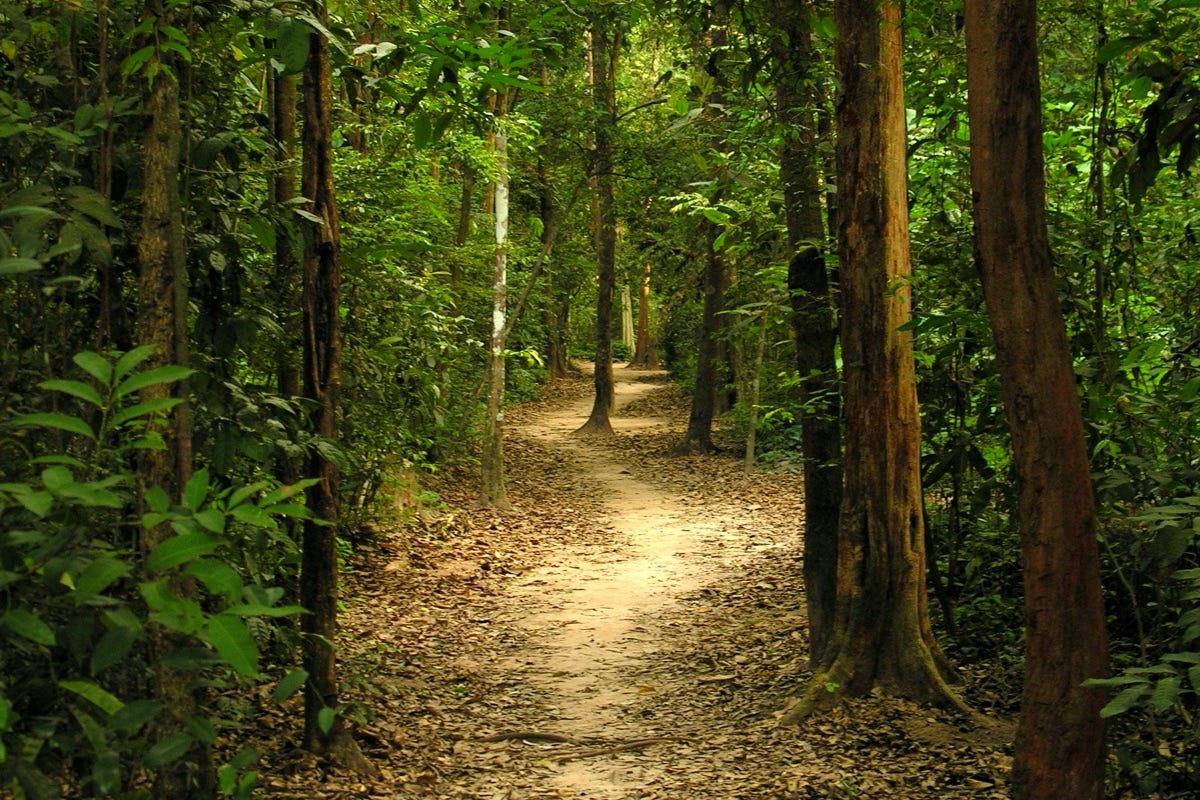


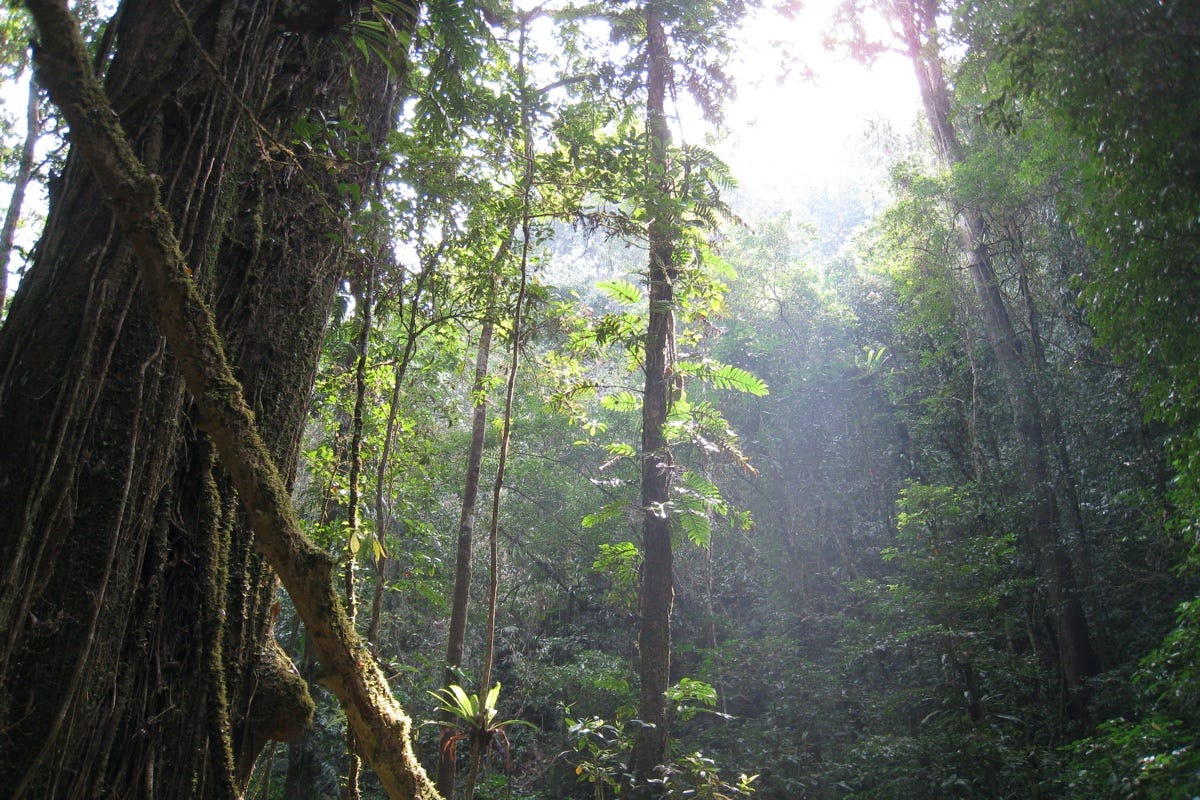

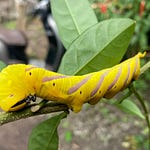
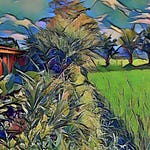

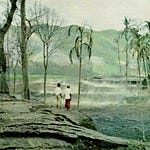

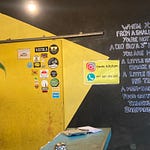
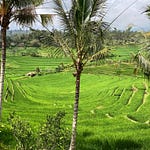

Share this post